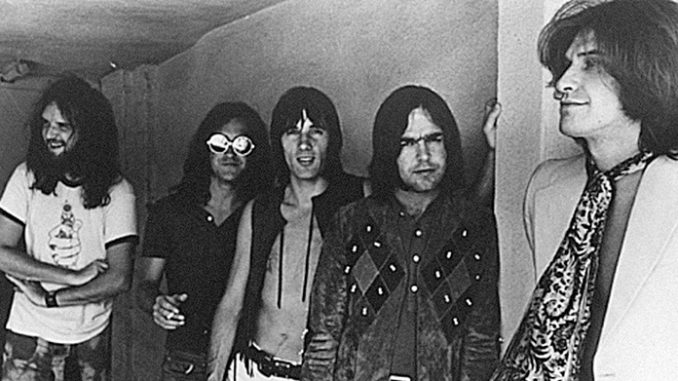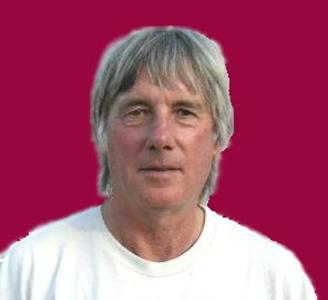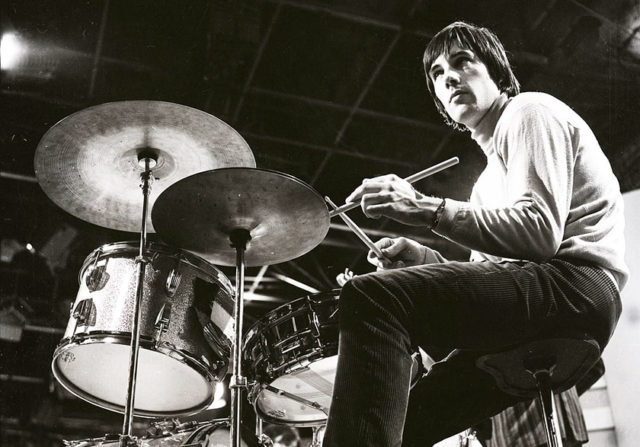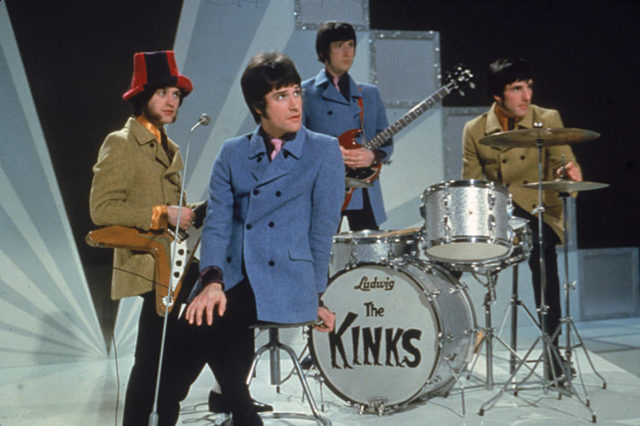
By Brian Wise
THE KINKS: LOLA VS POWERMAN & THE MONEYGOROUND PART 1 (50th ANNIVERSARY EDITION) (BMG):
Maybe Mick Avory wasn’t the best person to enlist in the publicity campaign surrounding the re-release in a deluxe box set of the Kinks.

“I still can’t believe it,” he says when I mention the various permutations of the re-issue. Drummer with the band for twenty years from 1964, involved in the running of Konk Studios for years after that and still a part of the business of the band, Avory is more musician and less salesmen than one might expect.
“All I want is a DVD or a CD or something,” says Mick when I suggest that it must be interesting to see all this old material re-emerge, and he adds, “All the paraphernalia that goes with it doesn’t really interest me, but the fans, they love all that.”
Just over fifty years on from its original release in November 1970, the album is now available as a single-CD, vinyl album and a Deluxe Box Set that includes three discs (the original album plus singles (stereo and mono mixes), B-sides, alternate original mixes, new medleys with Ray Davies plus Dave Davies’ spoken word commentary, new remixes and original session outtakes, previously unreleased session and live tape audio, instrumental and acoustic versions, previously unreleased demos and BBC material, a 60-page book — plus a pair of reproduction 7-inch singles of the albums hits, ‘Lola’/’Berkeley Mews’ and ‘Apeman’/’Rats.’
Avory, who also played for many years in a Kinks tribute band called Kast Off Kinks, admits that he used to give away his copy of the deluxe editions to their singer Dave Clarke.
“He loves that,” says Avory. “I used to end up giving all the stuff to him because he’s really into it. It’s surprised me that there’s so many people that would collect all that because they’re all outtakes and bits and pieces and old photographs and stuff like that, and little bits of interviews. But to someone who’s really into it, it’s like a hobby I suppose. Not for me. I don’t suppose anyone in the group, most of the people in groups don’t collect that.”
I suggest to Mick that he is supposed to be encouraging people to buy the box set. “No, they can buy it,” he replies. “I’ll give mine anyway, so someone gets the benefit. But they all go like hot cakes these things. It’s unbelievable.”
At least we know that if Mick ever sold anyone a car or house he wouldn’t be selling them a dud! Nevertheless, it is a thrill to talk to a member of one of my favourite ever bands and in his place, it is up to me to encourage you to investigate what is a marvellous re-release from one of Britain’s pre-eminent groups of the ‘60s and ’70s.
No songwriter has ever captured the English condition better than Ray Davies and on Lola Vs Powerman he not only did that superbly but also wrote two of the band’s biggest hit singles, including the controversial ‘Lola,’ maybe the first song about a transgender person. “The album is a celebration of artistic freedom (including my own) and the right for anyone to be gender-free if one wishes,” said Davies in a statement to coincide with the re-release. “The secret is to be a good and trusting person and friend.”
“Things weren’t going right in the group and I think we’d exhausted our relationship, or Dave and I had anyway,” says Avory, reflecting on why he left the group in 1984. “You all start off the same and you’ve got the same interests and everything, but you go in different directions sometimes and it’s not a band anymore. So, that’s when I butted out, but because I was there from the beginning I was in the company and attached to it all. Working at the studio has followed on quite naturally really.”
Avory says that he doesn’t see Dave Davies much – although Dave is trapped in the UK because of the pandemic – but that he is in contact with Ray who still lives in North London.
“He owns the studio,” says Avory. “So, I ring him every now and then. We get together and we have a little drink or a conflab about what’s going on record-wise or business stuff. So, I see Ray, normally. I haven’t seen him for about a year now because of this blooming pandemic, but normally I’d be seeing him now.”
Does Mick recall the recording of the album, which was done at Morgan Studios in Willesden? (Later, of course, they used Konk).
“After using Pye for many years, we reverted to Morgan,” recalls Avory. “We did that album there. Well, I say out of there. They had three studios in the end, but I think we used studio one or two mainly. I’ve got some recollection of it. I’ve got all the tracks in my head still: know what they sound like. Dave’s got a strong number on that one called ‘Strangers’. That was one of the best songs he did, I think. That was quite a strong track for that album. There’s ‘Lola’ and ‘Apeman’ on it, which were singles obviously.
“See, with the Kinks, it always moved onto something else. We went through different phases and different styles really. It was basically following what Ray had written about. So, the subjects changed a lot, as did the way we played them really. There are some that are similar to each other. I think ‘Apeman’ and ‘Lola’, musically, are fairly similar, same type of feel, half-time feel.

“In those days, we used to rehearse round Ray’s house, and that was when it was more of a band and we all got together a lot and we socialised and we’d rehearse together. Ray used to record us jamming together. I’d do a drum rhythm and the bass player would join in and sort of improvise on the theme and Ray used to record all that stuff because he knew he could work it into a song or an idea that he’d got. He had all those ideas on a tape and he could refer to them. That helped quite a lot with the way the band could play the song because they’d gel together on certain things. He didn’t always write the song completely, he’d write parts of it and put it together. So, it was an evolution, a development. But songs like ‘Apeman’, I think he wrote that off complete, but a lot of the time it was a gradual building.”
The big single, of course, was ‘Lola’, reaching the Top 10 around the world. Apart from the subject matter there was the controversy over the use of the Coca-Cola brand in the lyrics, necessitating a re-recording to replace it with ‘cherry cola.’ From the ’60s and into the early ’70s, and the heyday of the band, The Kinks would have met a whole range of very interesting, colourful characters whom Ray Davies would make the subject of a lot of his songs.

“Yeah,” agrees Avory. “Well, we used to know this Michael McGrath who used to work with John Stephen’s shop [Tre Camp] in Carnaby Street, and he used to do promotion and publicity for them – and he used to take pictures at Top of the Pops and television studios, anywhere he could get his face in. He got very friendly with the Kinks because he was gay. I think the name attracted him and we were a bit different and we used to dress up in colourful clothes, I suppose, at the time. So, it was something that drew him to us.
“Ray, obviously can write about something and make it into a song. Whatever comes his way, he can write about anything. So that’s how Lola came about.”
“He introduced to all these people because he knew them. A lot of them were in showbusiness. There were sex changes and all that. Never really heard of all that. He introduced us to these clubs that he used to go to, and he used to mix with all these people. Also, he used to hold court round his flat in Earl’s Court, and he used to invite all different people from all walks of showbusiness. We used to go up there, and it was like an evening’s entertainment because he’d introduce all these guests that he had. His mother used to have a separate little apartment in part of the same apartment (but she had her own little room just adjacent to him). So, it was a bit of a weird thing. But because of that, it opened a new world for us and we became aware of all these people. I don’t know for how long, but we used to go to clubs or go round his flat at that time, quite a lot, for a little while. Ray, obviously can write about something and make it into a song. Whatever comes his way, he can write about anything. So that’s how Lola came about.”
“But the actual subject of the thing was more important and more controversial than Coca-Cola, I would have thought” notes Avory, “but they didn’t ban the song. Funny. They’d play it on the condition we changed that word, that’s all.”
In some ways the song was way ahead of its time and groundbreaking for that period. “Yeah, it was,” agrees Avory. “I think that must have gone over their heads a bit because when you analyse what it’s all about, it’s a bit controversial. But now everyone knows about all that stuff. They can still relate to that song all this time after.”
The other big hit single from the album was ‘Apeman’ – a song that shares a similar theme to Dave Bartholomew’s New Orleans classic, ‘The Monkey.’ Davies spent a lot of time in New Orleans – and got shot there during a mugging in 2004 – so that wasn’t until decades later. However, on their early albums The Kinks did record songs by American artists such as Chuck Berry, Bo Diddley, Slim Harpo and Sleepy John Estes.
“Not essentially,” says Mick when I ask if they listened to any New Orleans music in the early days. “I used to listen to records at home and practice because I always liked jazz and I used to play with Jimmy Smith and I’d play along to those records because I had some pads and I just put the record on. I didn’t even have headphones, I think, I just played it.
“So, I think we all had different influences in a way, but when you got together, you sort of get into each other’s pocket and then it becomes a group thing. But Ray, he went to New Orleans quite a lot but I can’t remember when he first started going. He used to go in the ’80s and after that. That’s when he got shot.
New Orleans, it’s always been a music place through the ages. When we used to visit there, we went to Preservation Hall and places like that. Even the musicians that used to be in the Mike Cotton Sound, he was the banjoist, he left and went there because it was a great music place. We unearthed him playing with this band in one of the bars. It was a great atmosphere. I went two or three years ago but it’s lost it now, it’s not the same. All the hub that used to be is all a bit sleazy now, urban street and all that. It’s not like it was. You have to go out of town another mile and so. You’ve got one or two clubs and restaurants with a bit of music, but it’s not on the scale it was anyway.”
There had been some rumours over the past few years that Ray Davies might reform The Kinks at some stage over the past few years to celebrate some significant 50th anniversaries: The Village Green Preservation Society in 2018, Arthur (Or Decline and Fall of the British Empire) in 2019 and Lola vs Powerman, late last year. But, unfortunately, nothing came of the rumours.
“We’re not that close anymore really, musically,” admits Avory. “I left in the ’80s. Ray wanted to do it. Dave wanted to do it but do it his way and his way wasn’t Ray’s way. I thought, ‘I’ll do it if you can decide on something and you both want me to do it’ but, as it happened, they couldn’t decide on it. It’s like getting a deal with Brexit. That’s how it got. Couldn’t come to one conclusion.
“It goes on for years. Every now and then they pick it up and, ‘Oh, yeah, we should do this’ and get offers and everything, but no. Basically, Ray thought we should do it the sensible way, with the band, with as much of the originals as possible because it went on for so long and different phases of music. There were different people pass through the band and you could introduce them on stage. If we did a show, we could start off with all the music that affected me, sort of thing. We’d play the music that we were involved with.
“So, it would be an evolution of the Kinks, which I thought was the best idea really but Dave just wanted to do it with his family because he’s got a boy that plays drums. It’s all right if you want to make it a family affair – do it – but it’s not really what people want, I don’t think. Ray and Dave are family anyway, so you don’t have to have them all. Plus, the fact, if you’ve got someone young on the drums, he’s wasn’t anything to do with the bloody Kinks. Might be a marvelous player, I don’t know, but…..But at least after 50 years they’re still consistently disagreeing with each other.
“Some things never change. Never. They’re so bloody opposite. Everything. You couldn’t have more opposite people.”
“Some things never change. Never. They’re so bloody opposite. Everything. You couldn’t have more opposite people. But, in a way, that’s why it gave it another dimension. If they couldn’t agree on something, then they’d both do it their own way, but obviously Ray was in charge because he wrote the songs and stuff. But when they knocked their heads together, it really was strong. Obviously, Dave had some intuition there with playing the guitar for Ray’s songs, he knew instinctively what sound to get and what to play and didn’t have to write it down for him. He’d fool about with it and they’d come up with something that no one else could do. So, that was good.”
If Avory is not able to celebrate a Kinks 50th anniversary perhaps he might get an invite to another event coming up next year: the 60th anniversary of the formation of the Rolling Stones. At one point, Avory had the chance to join the band.
“Yeah,” he recalls. “I had a day job then and I didn’t drum for a living. Around that time, it wasn’t recommended you were a musician unless you were really hellbent on being one, or a drummer or whatever. People used to advise you: older people said, ‘It’s a very precarious business, and it’s not very likely you’re going to earn a living out of it. You’ll end up in a pit band or something, or just doing sessions and it all gets a bit boring.’
“But when the groups came along, it changed it completely. Before that, I suppose there was the jazz bands and big bands and all that stuff. I came in on that ebb. When I took up drumming it was with a skiffle band, but that was something you could actually do. I couldn’t play jazz, traditional or modern – just stepping in, you couldn’t do that. But skiffle was good because it gave you a nice little introduction because a lot of trad bands had a skiffle band as well because it was a fad and the kids liked it and it sold records. Lonnie Donegan was the master of it, was the king of it. It was enjoyable. There’s loads of people formed these bands and got little gigs. That’s how I started. I loved it to bits.
“When it came out of that, I sort of did a bit of rock and roll, I ended up in a hotel playing sort of jazz stuff. After about three years I went to a teacher – and they were all jazz drummers – and he taught me how to play jazz more than anything. So, it sort of set me off on that.
“It was only really a hobby, but the person I worked with sometimes, his dad was a drummer. This guy was a keyboard player and a vibe player, and he was very young. His dad was about 60-odd. So, he used to advertise in The Melody Maker and that’s how I got the link up with The Stones, through his dad, because he said, ‘Someone called Mick Jagger has phoned me up and they’ve got this rhythm and blues group they want to form. They’re just trying to do some gigs but they haven’t got a drummer at the moment and wondered if you might fit into it to do a gig at the Marquee Club in London.’ The old Marquee Club was great.” [The Marquee Club was very first place I visited when I went to live in London].
“So, I went up and that’s when I went there and met them all. They really wanted a regular drummer, but I said, ‘Well, no, I don’t do it for a living, just do it for odd gigs.’ I went back with the intent of doing the job but I never did. I said, ‘I don’t want to waste your time because you obviously want a drummer for good.’
After talking to Ian Stewart, he was the keyboard player at the time, he said, ‘This is going to develop into something because we’re bringing music from America. We’ll put our take on it, and it could be something really good.’ It was all right. Two years later, I thought, ‘I’ll have a crack at it’ and got contacted by the Kinks. So, that was it.”
If Avory has any regrets about not joining the Stones he doesn’t let on and as it turned out he had 20 very successful years with The Kinks.
“When you think back, when you start doing a little bit of revision and you say, ‘Blimey, I remember all that quite well’ and it seems to close the gap. But, 50 years, that’s nothing in my lifetime though, is it?” says Avory when I mention the anniversary. “I’m getting that old now, 50 years seems like just a little phase.”

